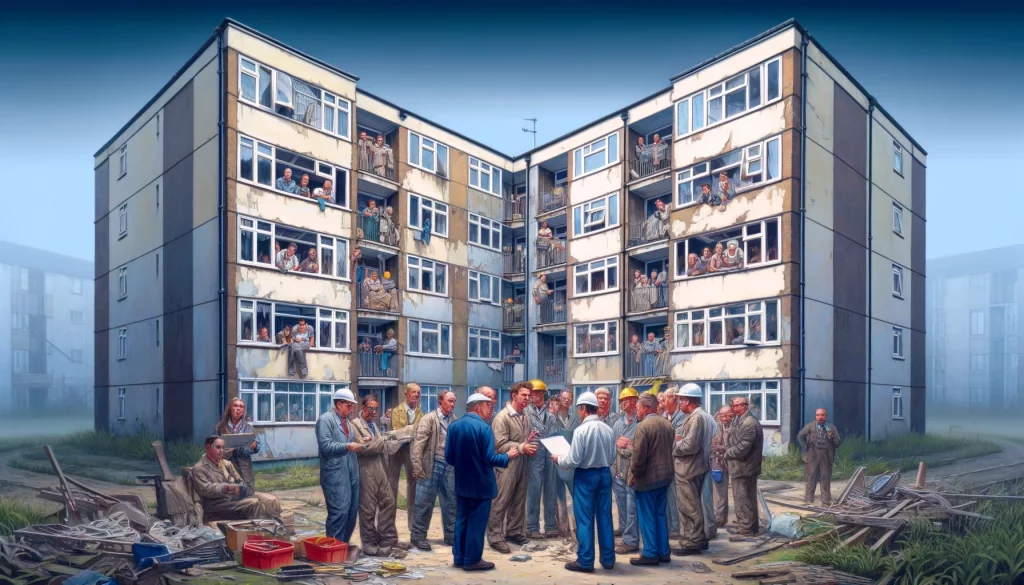CIH/NHF “rethink” repairs

The “Rethinking Repairs and Maintenance” report, produced by the Chartered Institute of Housing (CIH) and National Housing Federation (NHF), has been published to help housing providers deal with the dire state of their repairs service. The new guidance has six key themes – improving cultures and behaviours, inclusivity and tackling discrimination, structuring engagement, involving colleagues, and understanding performance.
Strangely, as the key piece of advice on how to improve the repairs service, the report focuses on staff attitudes. Why? Undoubtedly some council and Association staff routinely make racist or ignorant assumptions about their tenants. Sadly, these attitudes are not uncommon in British society at all levels. However, I would instead focus on the repairs and maintenance “problem” being caused primarily by the underfunding of social landlords. Homes have become run down and miserable, with intractable issues and a backlog of repairs.
The central problem, I believe, is not attitudes but resources. While staff and managers are, in my experience, hugely motivated to fix things for people, the homes we manage are under invested in.
Many of the homes we let are in poor condition. Homes classified as “Decent” with no actual disrepair are not necessarily good quality homes or fit for the family living there. How many of your homes are desirable? It is hard to achieve high levels of satisfaction if a house has not had a major refurbishment in over 40 years. It is difficult for tenants to think their home is good enough when it has leaky windows, cracked tiles in the bathroom, and grubby lino in the hall. When we let homes with inherent problems, we should not be surprised that we get asked to fix them up.
This is when the problems start. Homes are complex and contain lots of things that can go wrong. Leaks are a constant issue. Old windows and doors don’t open and shut properly. Anything electrical like a lift will eventually fail. Many are hard to keep warm, get mouldy and damp, while some overheat. Even homes in good repair are not always suitable for the specific family that lives there. So the housing officer, responsible for hundreds of dwellings, will soon be overwhelmed by problems to resolve. Social landlords’ budgets – designed to deal with routine maintenance – will soon be overwhelmed and colleagues be tempted to palm people off or make vague promises that can’t be delivered.
Behaviour change programmes are plaster over the cracks. The answer is to ensure that all our homes are modernised and defects and disrepair are eliminated. This will be expensive. But it’s an important message the CIH and NHF should be promoting. You can keep Mary Gober – Give us the F….ing Money!
Over emphasising behaviour and attitudes takes attention away from the serious neglect of stock investment and professional asset management which is key to unlocking repairs.
The report is also almost silent on the benefits of technology. Landlords have yet to discover large language models to pull together their existing property information. Without this 360 degree view, how can the staff member, whatever his or her positive customer-centric behaviour may be, hope to get the right repair done quickly. While the report notes stock surveys are useful, it doesn’t go beyond current practice, to ensure that a full home survey and repairs history is available in real time, while the housing officer speaks to the tenant with a complaint. Furthermore it doesn’t propose that landlords actively gather tenant views on their home, or propose that repairs contractors should pool their knowledge and data.
Or course the report is correct to note that relationship between landlords and tenants is unequal, with the tenant having to virtually beg for things from the landlord. How can this be tackled? By asking the tenant to walk around the home with the landlord pointing out what is a problem for them, just as a new home owner might do. This is a must. This is what power looks like – saying what needs to change in your home and having a member of staff who captures your issues and wishes, and orders the work. Even better would be to allow the tenant to order what they need from the maintenance team. The CIH/NHF recipe of “scrutiny” and sharing global data is a sop to tenants, expecting them to operate as a governance layer, when most people just want a decent property they can call home.
In my experience no one comes into this industry wanting to do people down or punish them for being poor or from a minority ethnic group. If staff are racist, or disrespectful, or find themselves opposed to our mission they should be shown the door. However, broad brushing discrimination as a cause ignores more fundamental barriers and underestimates the genuine commitment of the vast majority of people who work in social housing, and their desire to meet the needs of their tenants.
